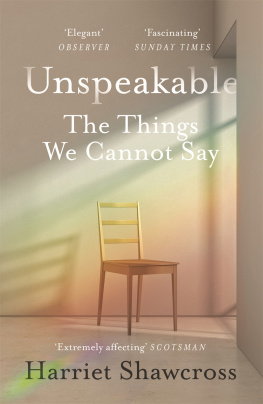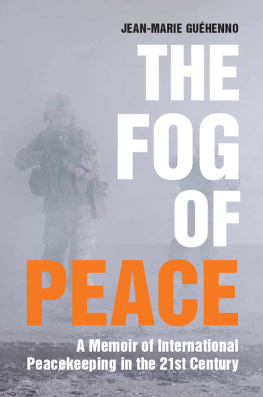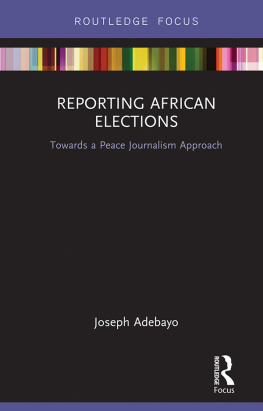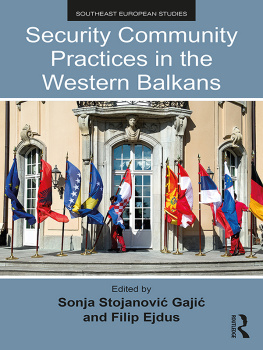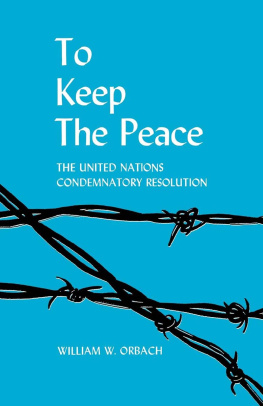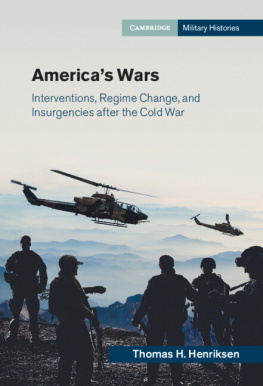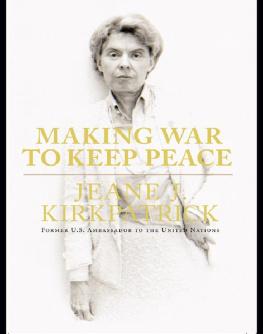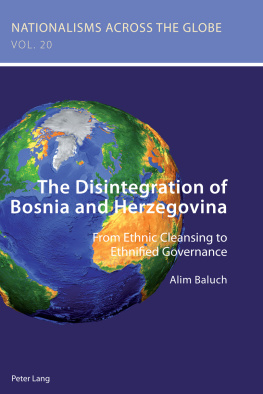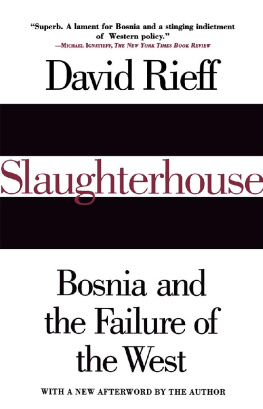Acknowledgments
I first became interested in the way in which the world responds to disasters when writing my book The Quality of Mercy, about the world and Cambodia in the early 1980s. Many of the UN officials whom I talked to then also played a part in the crises covered in this book. There are literally hundreds of people I should thank; I list some of them here.First of all, UN Secretary General Kofi Annan, for the assistance he has given me. The conclusions I have derived from this are entirely my own. Many other UN officials, past and present, senior and junior, have also given time and access. Again, they are not responsible for my conclusions. Among those I thank are former Secretary General Boutros Boutros-Ghali, Deputy Secretary General Louise Frchette, and Sadako Ogata, High Commissioner for Refugees, who invited me to serve on her informal advisory group. I also thank Nane Annan for all the time I have taken. I was helped by many others who have worked in the UN, in many different ways; they include: Isabelle Abric, Salman Ahmed, Yasushi Akashi, Hedi Anabi, Dame Margaret Anstee, Wagaye Assebe, Reg Austin, Tony Banbury, Martin Barber, Anne Willem Bijleveld, Jeff Bloor, Lakhdar Brahimi, Neil Briscoe, Ewen Buchanan, Richard Butler, Americo Canepa, Tim Carney, Jay Carter, Johan Cels, Hans Corell, Jeff Crisp, Brigadier Tim Cross, Manoel de Almeida e Silva, Tasa Delenda, Srgio Vieira de Mello, Berhanu Dinka, Charles Duelfer, Fred Eckhard, Rolf Ekeus, Ahmad Fawzi, Mary Fisk, Sylvana Foa, Andrew Gilmour, Sir Marrack Goulding, Martin Griffiths, Jaque Grinberg, Hope Hanlan, Peter Harland, Julian Harston, John Horekens, Anne-Marie Ibanez, Pierre Jambor, Kris Janowski, Soren Jessen-Petersen, Ian Johnstone, Michael Keating, Rolf Knutsson, Ulf Kristofferson, Karin Langren, Judy Ledgerwood, Elisabeth Lindenmayer, Andrew Mack, Michael Mc-Cann, Dennis McNamara, Mark Malloch Brown, Eric Morris, Nicholas Morris, Edward Mortimer, Izume Nakamitsu, Olara Otunnu, Nick Panzarino, Christophe Peschoux, Albert-Alain Peters, Sir Kieran Prendergast, Iqbal Riza, General Sir Michael Rose, John Ruggie, General John Sanderson, Emma Shitakha, Lamin Sisse, General Sir Rupert Smith, Gillian Sorensen, David Stephen, Peter Swarbrick, Terry Taylor, Min Thant, Shashi Tharoor, Tim Trevan, Mourhad Wahba, Michael Ward, Benny Widyono, Michael Williams, Susan Woodward, Nadia Younes, Kirsten Young and Prince Saeed Zeid-Raad.
At Simon & Schuster, I am grateful to Alice Mayhew, Roger Labrie and Brenda Copeland, and Charlotte Gross and Steve Messina, who copyedited with skill and patience; my thanks also to Carolyn Reidy and Victoria Meyer. At Bloomsbury, to Bill Swainson, Nigel Newton and Liz Calder. I am grateful also to my literary agents, Lynn Nesbit in New York and Carol Heaton in London.
For many different sorts of conversation, help, hospitality or encouragement, I am grateful to Mort Abramowitz, Sheppie Abramowitz, Anne-Douglas Atherton, Harry Atherton, Hrair Balian, Zeinab Bangura, Peter Barthu, Elizabeth Becker, Jacques Bekaert, Chris Bennett, Mats Berdal, Jane Beresford, Rudi von Bernuth, Christiane Besse, Tony Besse, Xandra Bingley, Urs Boegli, Eilean Boniface, Emma Bonino, Norbert Both, Rosie Boycott, Ben Bradlee, Caroline Brooke, Peter Buckle, Kevin Buckley, David and Inger Burns, Vicky Butler, David Chandler, Carole Corcoran, Chris Cuny, Gene and Charlotte Cuny, Alison Des Forges, Sue Downie, Michael Elliott, Karen Emmons, Gareth Evans, Sir David Frost, Sir Martin Garrod, Adama Gaye, Christopher Geidt, Janine di Giovanni, Ed Girardet, Misha Glenny, Nik Gowing, Anne Grant, Iain Guest, Roy Gutman, David Hamburg, Sir David Hannay, Steve Heder, Lindsey Hilsum, Richard Holbrooke, John Holloway, Anna Husarska, Michael Ignatieff, Alice Jay, Julio Jeldres, Roland Joff, Randolph Kent, Carole Kismaric, Anne Lapping, Heather Laughton, Sochua Mu Leiper, Mary-Kay Magistad, Kishore Mahbubami, Kati Marton, Tom Maslund, Leonard Mayhew, Stanley Meisler, Judy Miller, Jonathan Mirsky, Jonathan Moore, Stephen Morris, Aryeh Neier, Dame Pauline Neville Jones, Kathleen Newland, Susan Osnos, Kevin OSullivan, Lord Owen, Tim Page, Coral Pepper, Gretchen Peters, Samantha Power, Sally Quinn, Charles Radcliffe, Ahmed Rashid, Tony Rennell, Paul Revay, David Rieff, Adam Roberts, Filippo di Robillant, Michael Robinson, Elizabeth Rubin, Sydney Rubin, John Sanday, Richard Sennett, Brooke Shearer, David Shearer, Lloyd Shearer, Marva Shearer, Robert Silvers, Steve Solarz, Mark Storella, Demelza Stubbings, Jon Swain, Julia Taft, Strobe Talbott, Tiziano and Angela Terzani, Nate Thayer, Jules Thomas, Dessa Trevisan, Charles Twining, Bob Tyrer, Salim Vahidy, Nick Warner, Rob Watson, Edouard Wattez, Sir John Weston.
An inordinate number of UN, ICRC and NGO officials have died or been killed while I was writing this book. Several were friends who helped me. They include Fred Cuny, with whose story I began this book; Nicholas Hinton, the first president of the International Crisis Group, who died of a heart attack while on assignment in Croatia; Yvette Pierpaoli, dedicated to refugee welfare since Cambodia in the 1970s, who was killed in a car crash in Albania during the Kosovo war while on a mission for Refugees International. With her died Penny and David McCall and their Albanian driver. Pierce Gerety, a courageous UNHCR field worker, survived great danger in the Great Lakes crisis only to die in the Swissair Atlantic crash in 1998. All these, and others, are remembered with gratitude.
Finally, and above all, I thank my wife, Olga, and my children, Conrad and Ellie, and stepdaughters, Alex and Charlie, for enduring this work.
1
Another World War
ON a dark afternoon in January 1999, with the wind chill factor down to minus ten and snow rushing around outside the thirtyeighth floor of the United Nations headquarters in New York, the secretary general, Kofi Annan, could be forgiven for feeling beleaguered. Nineteen ninety-eight, he said to me, was a hell of a year. But I think 1999 will be worse.
Eleven months before, he had been hailed in much of the world as a savior after persuading Saddam Hussein to permit UN inspectors to resume their search for Iraqi weapons of mass destruction, thus stopping the United States and Great Britain from bombing Iraq. One newspaper called him the worlds secular pope, a phrase which recalls Joseph Stalins mocking question, How many divisions has the pope?
But within weeks Saddam had reneged on his agreement with Annan; Iraq continued to flout countless resolutions of the Security Council. For months Annan had continued to try to be the peacemaker, and in November 1998 he finessed another delay in a U.S. attack aimed at forcing Iraq to comply with the resolutions, to the fury of some American policymakers. But in December the United States and Britain lost patience and responded to Iraqi intransigence with four days of bombing just before Ramadan and Christmas.
The Anglo-American action split the Security Council. There was no precise warning when it began on December 16. Members of the council were debating the crisis when their cell phones started ringing almost in unison. Some, particularly the Russian ambassador, Sergei Lavrov, and the French ambassador, Alain Dejammet, were furious. Annan made a short statement: This is a sad day for the United Nations, and for the world. It is also a very sad day for me personally.
Annan tried to find a way of reuniting the council. It was not easy. He had continual calls or visits from the Russians and the French to complain about the attacks. The French were especially bitter; from President Jacques Chirac down, they denounced les anglo-saxons, by whom they meant not only the United States and Britain but also Richard Butler, the tough and sometimes undiplomatic Australian chairman of the UNs Iraq arms inspectors, UNSCOMthe United Nations Special Commission, which had been set up to disarm Iraq completely of its weapons of mass destruction after the Gulf war in 1991. Butlers December 1998 report alleging continued Iraqi obstruction had been the casus belli for the bombing. Butler must go, Chirac said several times to Annan. The Russians said the same, more brutally and more publicly.


